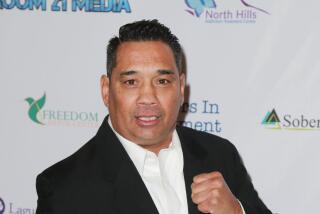Bell won’t be able to touch some of Rizzo’s wealth
When Robert Rizzo pleaded no contest to corruption charges last month, many of the trappings of his former life as Bell’s highly paid city manager were gone: the house near the ocean in Huntington Beach, the horse farm outside Seattle, the stable of racehorses.
But Rizzo still has two lucrative streams of money from his days in local government that neither Bell nor prosecutors can touch: his 401(k)-style retirement account that once held more than $1 million and an annual pension of $116,628.
As part of Rizzo’s plea, he is expected to spend years in prison and probably will be ordered to pay up to $3.2 million in financial compensation to the city. But city officials say they are legally prevented from going after the pension and the retirement account — which appear to be Rizzo’s main remaining assets — limiting how much the city can get back from him.
City leaders say it’s a bitter pill because Rizzo amassed much of the retirement money by paying himself more than $1 million a year.
“It’s mind-boggling that after so much he did that he’s still able to receive money from the city because of the pension,” Bell Councilman Ali Saleh said. “He’s done dramatic damage to our city.”
Rizzo’s attorney said his client wants to make amends and help the city but that he is entitled to his retirement money.
“Mr. Rizzo has earned it,” said his attorney, James W. Spertus. “He spent 30 years in public service and everyone is focusing on the last two or three. Most retired city managers with 30 years of service are making what Mr. Rizzo made from his pension or more.”
Spertus said Rizzo could be forced to pay as much as $3.2 million in compensation to Bell, but city leaders are not sure where that would come from.
Since Rizzo’s arrest, he has been battling on several fronts over various financial issues.
Rizzo’s pension, once valued at more than $600,000 a year based on his pay in Bell, was slashed to $50,000 a year by the California Public Employees’ Retirement System, the state’s largest public pension system. But when he challenged the pay cut, CalPERS bumped it back up to more than $116,000 last January.
Rizzo received some bad news earlier this month, though, when a state appeals court ruled that Bell did not have to pay his legal bills related to the corruption case. He appealed, but the court turned him down.
“So much for Rizzo making amends to Bell,” said Anthony Taylor, Bell’s lead litigation counsel.
Rizzo will join a long list of public officials who have continued to draw large pensions after being convicted of a felony. State law says that an elected official convicted of a felony loses his pension, but an appointed city official like Rizzo is not covered by the law.
In 2007 after outrage that former Rep. Randy “Duke” Cunningham, a San Diego-area Republican, would receive his congressional pension after being convicted of taking bribes and evading taxes, President George W. Bush signed a bill denying pensions to lawmakers convicted of felonies.
Rizzo’s financial situation, attorneys for the city say, is similar to O.J. Simpson’s. The former football player’s retirement benefits are untouchable despite the $33.5-million wrongful death judgment against him for the 1994 slaying of his ex-wife and her friend.
Rizzo is expected to be sentenced in March after pleading no contest to misappropriating public funds, hiding and falsifying records, perjury and other crimes. He faces 10 to 12 years in prison, but with good behavior he’d spend about half that time behind bars.
David J. Cook, a San Francisco attorney who has pursued Simpson’s money, said authorities should subpoena any loans Rizzo took out over the years for homes or cars, for example, because they would provide a snapshot of his assets at the time.
It is unclear how much Rizzo has in his retirement account. At one point it exceeded $1 million. But he’s agreed to pay $242,720 back to the city.
Some are outraged that Rizzo is receiving anything.
“His pension will sit in bank accounts earning interest while he’s in prison and taxpayers are paying his room and board,” said Dan Reeves, chief of staff to state Sen. Kevin de Leon (D-Los Angeles), whose bill to prevent convicted administrators from suing cities over pensions was recently signed into law.
“It seems like there should be restitution to taxpayers to at least pay room and board while he’s in prison,” he said.
Rizzo once lived in a four-bedroom, five-bath home, but these days he lives in a condominium in Torrance owned by his mother-in-law, tucked behind a guard shack.
He sold the Huntington Beach house for $939,000 in 2011, at a loss of $191,000.
The Washington horse ranch has a short sale pending for $575,000, according to real estate agent Cari Franklin, meaning it is selling for less than what the bank is owed. Rizzo bought the ranch for $930,000 in April 2004, around the time his salary began to skyrocket.
No one has lived at the 10-acre ranch for almost two years, the pastures are overgrown and the buildings are in disrepair and have been vandalized, Franklin said.
“The property,” she said, “is not what it was in the past.”
More to Read
Start your day right
Sign up for Essential California for news, features and recommendations from the L.A. Times and beyond in your inbox six days a week.
You may occasionally receive promotional content from the Los Angeles Times.







